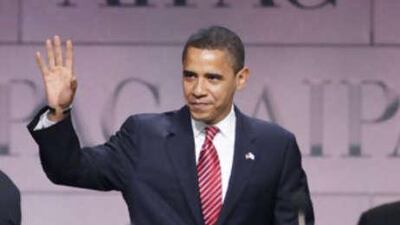Ramallah, west bank // Ask many Palestinians or Israelis and they will tell you that US presidential elections are so important for their futures they should be allowed to vote. Like Israelis, Palestinians see Washington as the most influential third-party player in their conflict. Unlike Israelis, Palestinians see that influence as mostly malign. Both will carefully watch John McCain and Barack Obama as they try to become the leader of the world's only superpower. And where polls show Israelis split over which senator they would support, Palestinians overwhelmingly favour Mr Obama.
Yet that support is qualified by cynicism. Palestinians have no illusions when it comes to the US position on the Palestinian-Israeli conflict. "America," a local restaurateur recently told me, "is irredeemably pro-Israel. I only support Obama because I think he will be good for America and good for black people. For us it will make no difference." Indeed, political observers in the Palestinian territories are divided between those that feel US support for Israel can be mitigated enough for a reasonable agreement to be arrived at and those who think Washington will only grow more fervent in a position that is institutional rather than political or pragmatic. The difference is significant in that it determines whether any faith can be placed in a negotiated process that has Washington as the sole significant arbiter.
Yet there can be no denying that Mr Obama's candidacy has created some excitement, not only in the Palestinian territories, but throughout the region. His position on Iraq and Iran, where he has promised withdrawal and diplomacy respectively, has acted like a balm on a festering wound. His background and minority status have also raised hopes that he would somehow be more sympathetic to Arab concerns, not least Palestinian. The announcement yesterday that, unlike Mr McCain, Mr Obama will visit Ramallah - on July 23 - during his swing through the region will strengthen his image as more even-handed.
Even his numerous pro-Israel comments have been excused. In a speech last month to AIPAC, the influential pro-Israel lobbying group in Washington, Mr Obama said: "Jerusalem will remain the capital of Israel, and it must remain undivided." However, on Sunday, Mr Obama said he had used "poor phrasing" in making that statement. "The point we were simply making is that we don't want barbed wire running through Jerusalem, similar to the way it was prior to the '67 war, that it is possible for us to create a Jerusalem that is cohesive and coherent," Mr Obama said.
Yet after the speech to AIPAC, a Hamas official told me that he understood such remarks as "campaigning". "We will wait [with both candidates] to see what are their actions, and will not judge them on what they say now," said the official. Publicly, Palestinian leaders will welcome Mr Obama's "clarification" on his statement on Jerusalem - just like they condemned it originally - without setting much store by it privately. What else is to be expected from a US candidate? Palestinians - a political people - are acutely aware of the odds they are up against in Washington. Ask anyone and they will point to the influence of the pro-Israel lobby and the voting record of the US congress. Support for Israel, they will tell you, is the issue that garners the most cross-political agreement in the US House of Representatives.
But there is also an issue of substance. After all, to say, as Mr Obama did on Sunday, that Jerusalem should not be physically divided - or should "remain cohesive and coherent" in his words - is hardly a eureka moment. No plan put forward in any official negotiations has ever envisaged Jerusalem as actually divided. One-state, two-state or no-state, no scenario predicts a visible borderline in the city itself as it was before the 1967 occupation by Israel of East Jerusalem. The division is supposed to be administrative and one of sovereignty in an otherwise open city. Practically, it cannot be otherwise.
Israeli officials may react differently to Mr Obama's belated correction. Israel knows that a US presidential candidate needs to show unstinting support for the country in order not to come under sustained attack on his foreign policy. This, in other words, is a good time for pro-Israel supporters to pressure candidates to make unequivocal statements on Israel. As such, they will not be pleased with Mr Obama's U-turn and will likely make a meal of it.
Privately, however, Israeli officials too will not set much store by his comments. These do not veer in any way from current US policy. Every year, in fact, George W Bush, the US president, just like Bill Clinton, his predecessor, has had to veto a 1995 motion by the US Congress to move the US Embassy to Jerusalem in order that it "remain the united capital of the State of Israel". That is unlikely to change regardless of who succeeds Mr Bush in the White House.
Indeed, the present incumbent is the prime reason why US presidential elections are so keenly anticipated here. Palestinians, and some Israelis, consider Mr Bush the worst thing to have happened to the Palestinian-Israeli conflict if not the entire region. Anyone is better and Mr Obama, having marked out a clear break with this administration, is the more welcome. @Email:okarmi@thenational.ae

